Natural or Man-made? Which work surface should you choose for your bespoke kitchen?
In the world of luxury bespoke kitchens, the choice of a worksurface material can significantly impact the overall aesthetics and functionality of the space. One of the key decisions to make is whether to go for the timeless charm of natural stone or the precision-engineered allure of man-made surfaces. In this article, we delve into the main categories available for stone countertops, weighing the merits of natural and man-made choices.
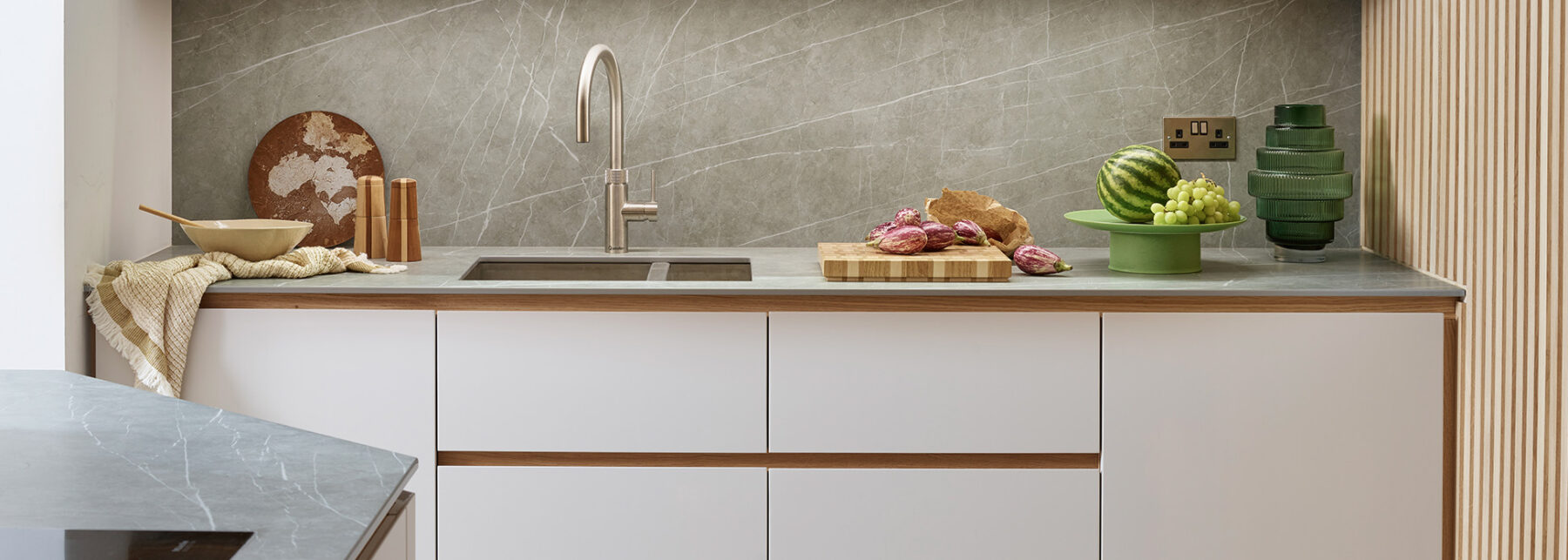
The Natural Beauty of Stone Surfaces
Natural stone surfaces encompass a rich array of materials, including marble, granite, quartzite, and even semi-precious stones. Each type boasts a unique set of colors, patterns, and textures, making the selection process an artistic journey. Natural stones are formed through geological circumstances and events, resulting in breathtaking slabs that showcase the earth’s natural beauty. The geological processes involved in their creation contribute to the uniqueness of each slab, ensuring that no two countertops are alike.
Authenticity
The beauty of a natural surface lies in its authenticity and the fact that it’s a product of nature. The variations in colour, veining, and mineral patterns are a testament to the uniqueness of each slab. People go out of their way to find
Considerations
Natural patina
It is important to note that natural surfaces can be softer and more porous than their man-made counterparts, making them susceptible to staining. It’s a trade-off for the authenticity they bring to the kitchen. A homeowner specifying a natural stone finish must be at peace with the idea that their worksurface will develop a natural patina over time. Despite the natural allure, for most, this trade-off is unacceptable as when investing in a bespoke kitchen they want to preserve the as-new aesthetic for as long as possible. For this reason we try to guide our customers towards man-made stone (particularly in lighter colours) unless the customer is adamant that want natural stone and is fully aware of the properties and characteristics of the selected stone.
Availability
Unlike man-made stones, which are fabricated according to demand, natural stone is quarried, and supply is limited to what is being excavated at any given time. For customers seeking a particular look, it is strongly advised to start the search for the perfect slab far in advance of the project installation. Also, be prepared to put in the time and miles to visit stone yards to find the slab which speaks to you!
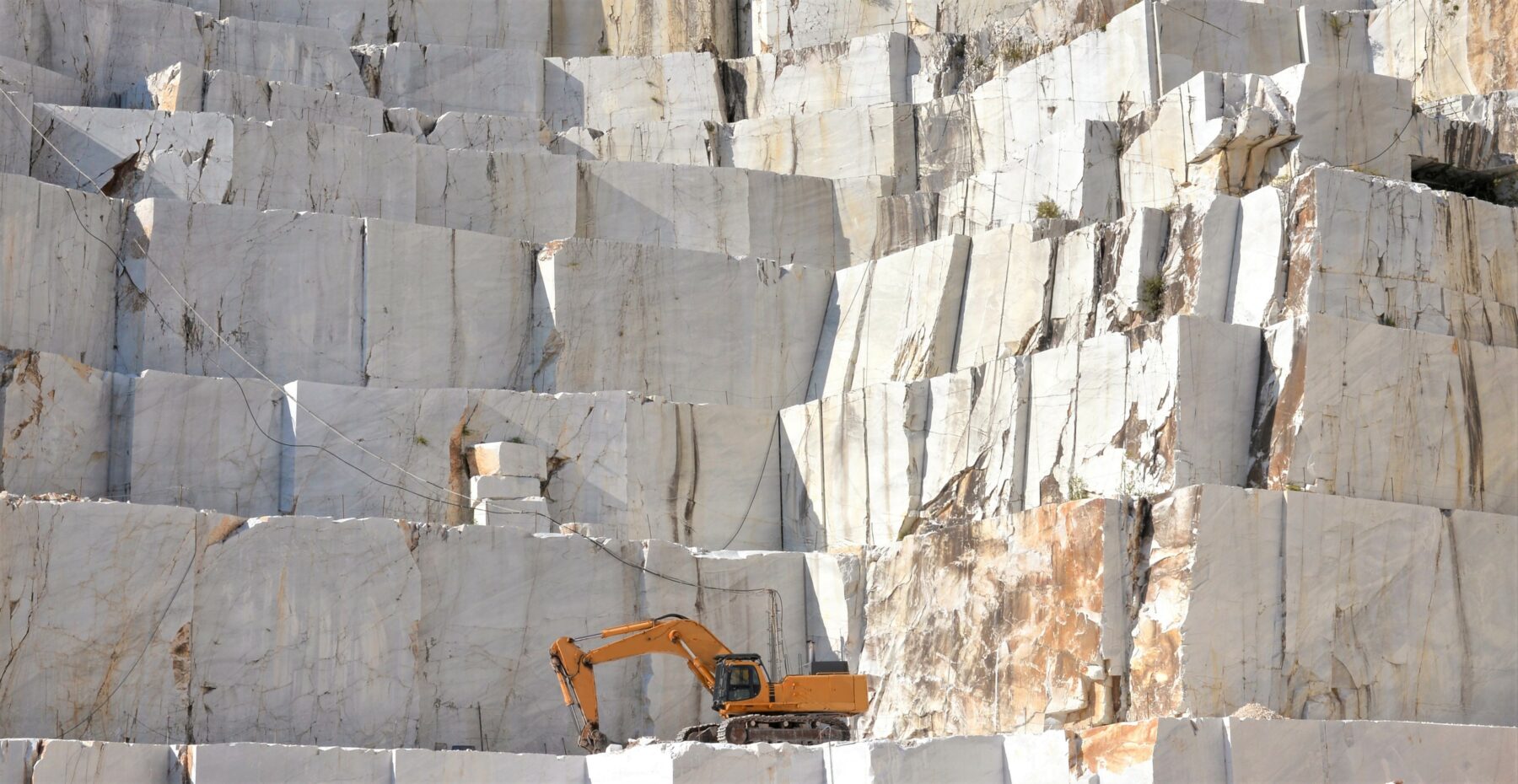
What are the most common options for natural stone worktop surfaces and their chracteristics?
Marble
Known for its timeless elegance and unique veining patterns, marble is a metamorphic rock primarily composed of calcite or dolomite.
Benefits: Aesthetic appeal, cool to the touch, and the ability to withstand heat.
Drawbacks: Susceptible to scratches, stains, and requires regular sealing. Not recommended for high-traffic areas.
Granite
An igneous rock with a granular texture, granite is durable and comes in a variety of colors and patterns.
Benefits: Excellent durability, resistance to scratches and heat, and a natural, polished appearance.
Drawbacks: Requires periodic sealing to prevent staining, and some varieties may be more porous than others.
Quartzite
A metamorphic rock formed from sandstone under heat and pressure, quartzite often resembles marble but is harder and more durable.
Benefits: High resistance to heat and scratches, unique patterns, and a durable option for kitchens.
Drawbacks: Like other natural stones, it requires sealing to prevent stains, and individual quartzite varieties may vary in hardness.
The Precision of Man-Made Surfaces
Man-made surfaces offer meticulous control over finishes and potentially enhanced durability compared to natural stone. With hundreds of options available from various manufacturers, the world of man-made surfaces is ever-expanding. From subtle veining to bold and vibrant patterns, the choices cater to diverse tastes and design preferences.
What are the options for man-made stone worktop surfaces?
Within the realm of man-made surfaces, three options stand out – Quartz, Solid Surface (Corian and alternatives), and Sintered Stone. These materials boast specific properties, characteristics, and benefits that cater to different needs.
Quartz
Renowned for its non-porous nature, durability, and a wide range of colours and patterns. It is also resistant to scratches and stains.
How is it made?
Quartz surfaces, often recognized for their luxurious appearance and durability, are manufactured using a blend of natural quartz crystals, resins, and pigments. The process begins with carefully selected quartz crystals, which are ground into a fine powder. This powder is then mixed with resins and pigments to create a homogeneous mixture.
Through a process known as vibrocompression, the mixture is compacted and cured to form solid slabs. The slabs are then subjected to high temperatures to ensure proper curing and hardening. The final result is a non-porous and resilient surface, offering a perfect blend of nature’s beauty and engineered precision.
What is it made of?
Quartz surfaces typically consist of approximately 90-95% crushed natural quartz crystals. The remaining composition includes resins (usually polymer resins) to bind the quartz particles together, as well as pigments for coloration. The precise ratio of these components contributes to the material’s strength, durability, and aesthetic qualities.
Here is a list of reputable manufacturers producing quartz worksurfaces:
Caesarstone: A globally recognized brand, Caesarstone is known for its high-quality quartz surfaces available in a wide range of colours and patterns. Their surfaces are renowned for durability and design versatility.
Silestone by Cosentino: Silestone, a product of Cosentino, offers quartz surfaces with antimicrobial properties and impressive stain resistance. It is available in an extensive array of colours and finishes.
Quartzforms: Quartzforms is a German manufacturer recognized for its premium quartz surfaces that boast a perfect blend of style and functionality. Their surfaces are available in various thicknesses and finishes.
Compac: Compac is a Spanish company that produces quartz surfaces with a commitment to sustainability. Their quartz products are known for their strength, scratch resistance, and diverse design options.
Cambria: Cambria is an American company that produces natural quartz surfaces with a focus on design innovation and environmental sustainability. Their surfaces are known for being durable and low-maintenance.
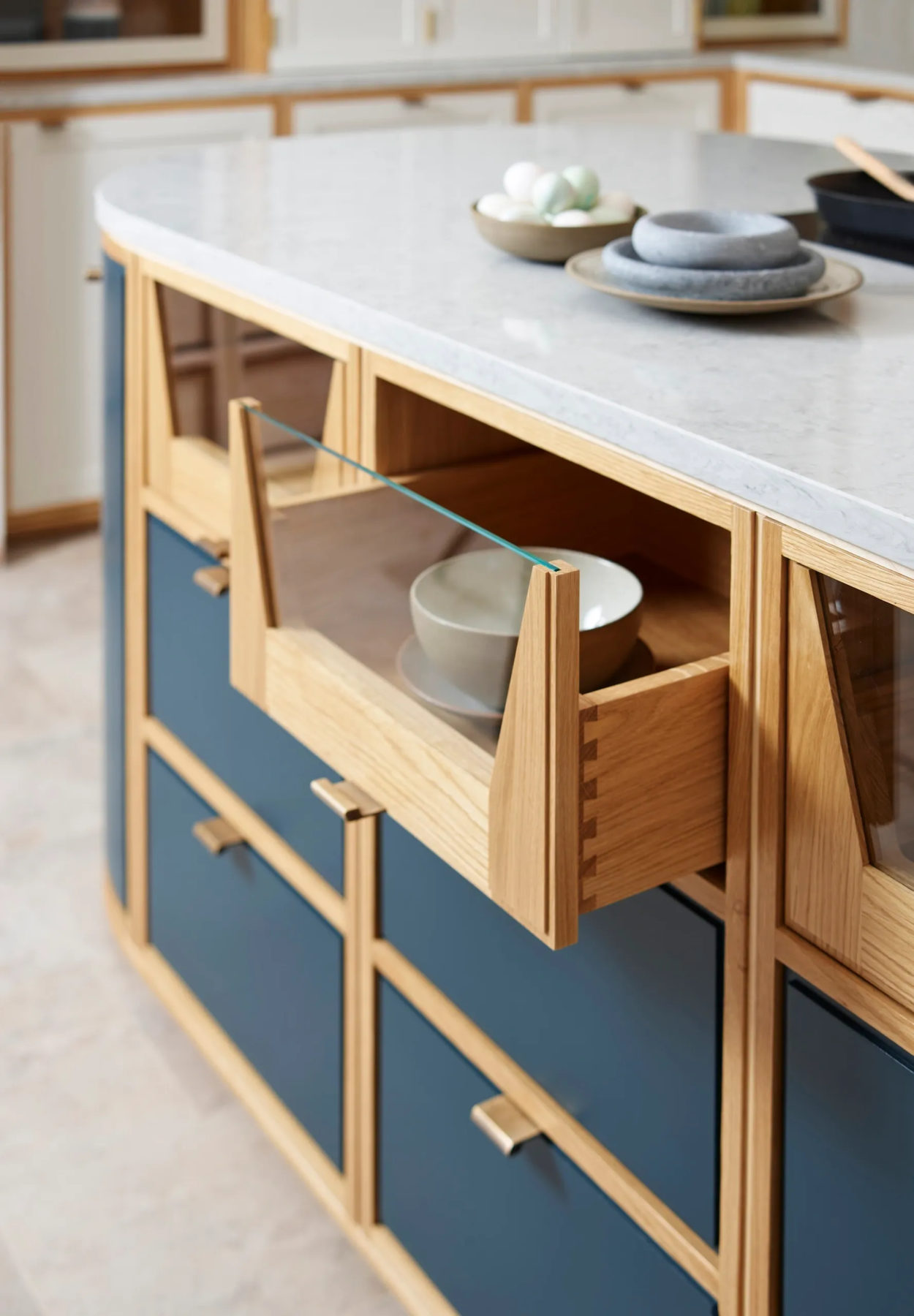
Sintered Stone
Known for its exceptional durability, resistance to heat, and minimal porosity, making it a versatile and resilient choice.
How is it made?
Sintered stone, an engineered material, is created through sintering. Raw materials, including natural minerals, clays, and feldspar, are finely ground into a powder. Extreme heat and pressure fuse the powder, creating a dense, ultra-compact slab with exceptional durability, minimal porosity, and resistance to heat, scratches, and stains.
What is it made of?
Sintered stone comprises natural minerals like quartz, feldspar, and silica, without resins. This composition offers resistance to heat and UV rays, making it an ideal choice for a reliable and consistent surface.
Here is a list of reputable manufacturers producing sintered stone worksurfaces:
Dekton by Cosentino: Cosentino, a leading name in the industry, produces Dekton, a sintered stone renowned for its durability and resistance to scratches, stains, and extreme temperatures.
Neolith: Neolith is a popular sintered stone brand known for its innovative designs and versatile applications. It offers a wide range of finishes and thickness options.
Lapitec: Lapitec specializes in the production of sintered stone surfaces with unique technical and aesthetic characteristics. Their surfaces are appreciated for their strength and durability.
SapienStone: SapienStone specializes in large-format sintered stone slabs designed specifically for kitchen countertops. Their products are recognized for their durability an ease of maintenance.
Techlam by Levantina: Levantina’s Techlam is a sintered stone brand offering ultra-thin, large-format slabs. It is known for its lightweight yet durable characteristics, making it suitable for diverse applications, including kitchen countertops.
When considering sintered stone for your kitchen worksurface, exploring products from these reputable manufacturers ensures access to high-quality materials that combine aesthetics with exceptional performance.
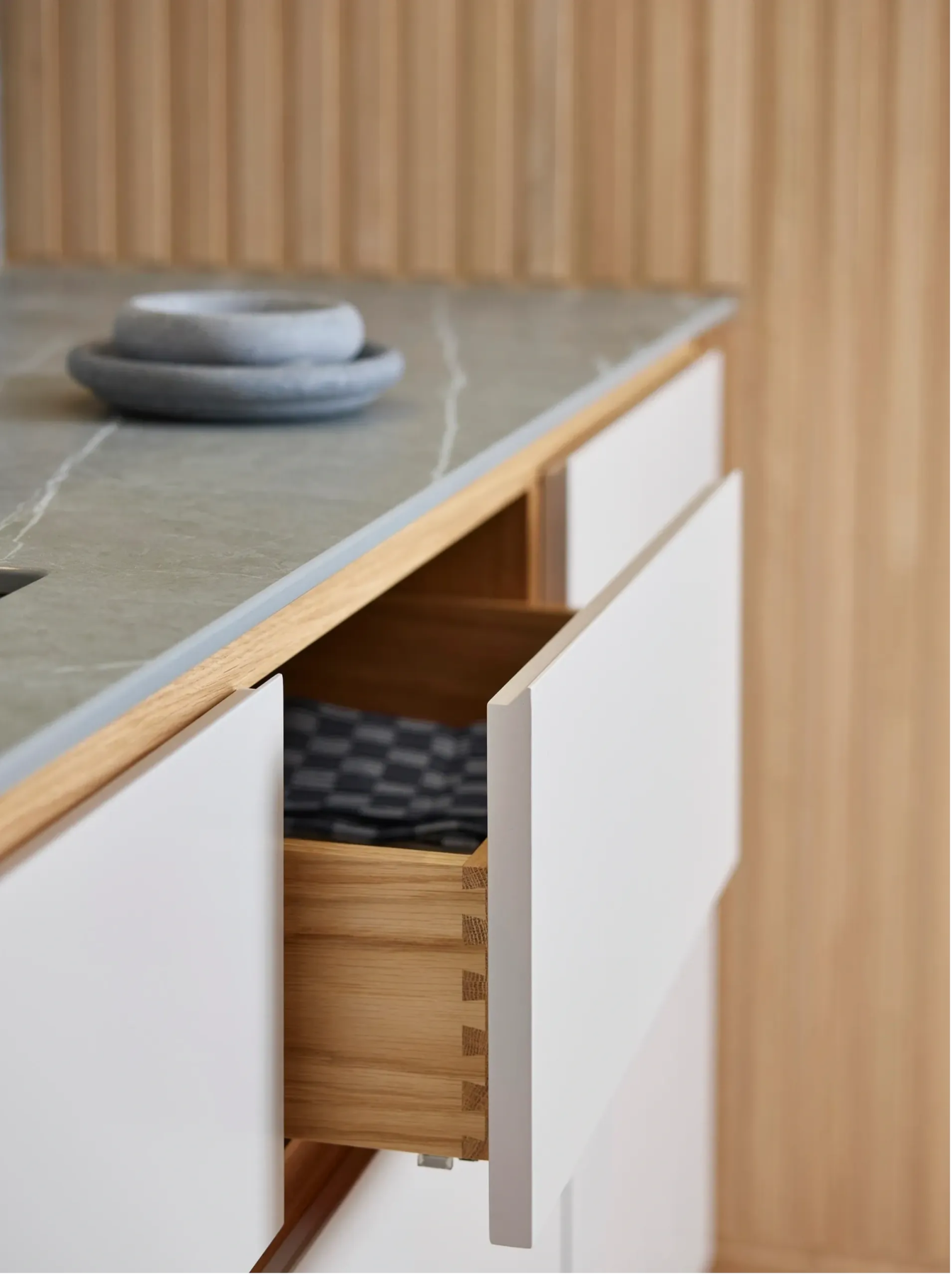
Solid Surface
Exemplifies seamless design possibilities, being non-porous, hygienic, and easily repairable. Solid surface can be moulded under heat and pressure, unleashing design opportunities from seamless integrated sinks to elaborate organic forms.
Manufacturing Process: Solid surface materials, like Corian, are crafted from acrylic polymers and natural minerals. Acrylic resin is combined with finely ground mineral particles, cast into sheets or molds, and cured. The material is sanded for a seamless finish, providing design flexibility.
Composition: Solid surface materials contain 70-75% mineral filler (aluminum trihydrate) and 25-30% acrylic resin. This composition results in a non-porous, hygienic surface with design flexibility, making it a favored choice for a seamless kitchen surface.
In summary, sintered stone, quartz, and solid surface materials offer homeowners diverse choices to match aesthetic preferences and practical needs in a luxury bespoke kitchen.
Here is a list of reputable manufacturers producing sintered stone worksurfaces:
Corian by DuPont: DuPont’s Corian is a pioneer in the solid surface industry, known for its seamless and versatile designs. Corian surfaces are renowned for their durability, hygienic properties, and wide range of colors.
Staron by Samsung: Staron, a brand by Samsung, offers solid surface solutions characterized by their smooth, non-porous finish. The surfaces are known for being easy to clean, repairable, and available in various colors and patterns.
Hi-Macs by LG Hausys: LG Hausys produces Hi-Macs, a solid surface material that emphasizes both aesthetics and functionality. Hi-Macs surfaces are durable, non-porous, and suitable for a variety of applications.
Formica Solid Surface: Formica, a respected name in surfacing solutions, produces solid surfaces that combine style with practicality. Formica Solid Surface is known for its resistance to stains and impact.
Hanex Solid Surfaces:Hanex Solid Surfaces offers a diverse range of solid surface materials known for their durability and aesthetic appeal. Their surfaces are suitable for various applications, including kitchen countertops.
Considering products from these leading solid surface manufacturers ensures access to high-quality materials that provide both design flexibility and durability for your kitchen worksurface.
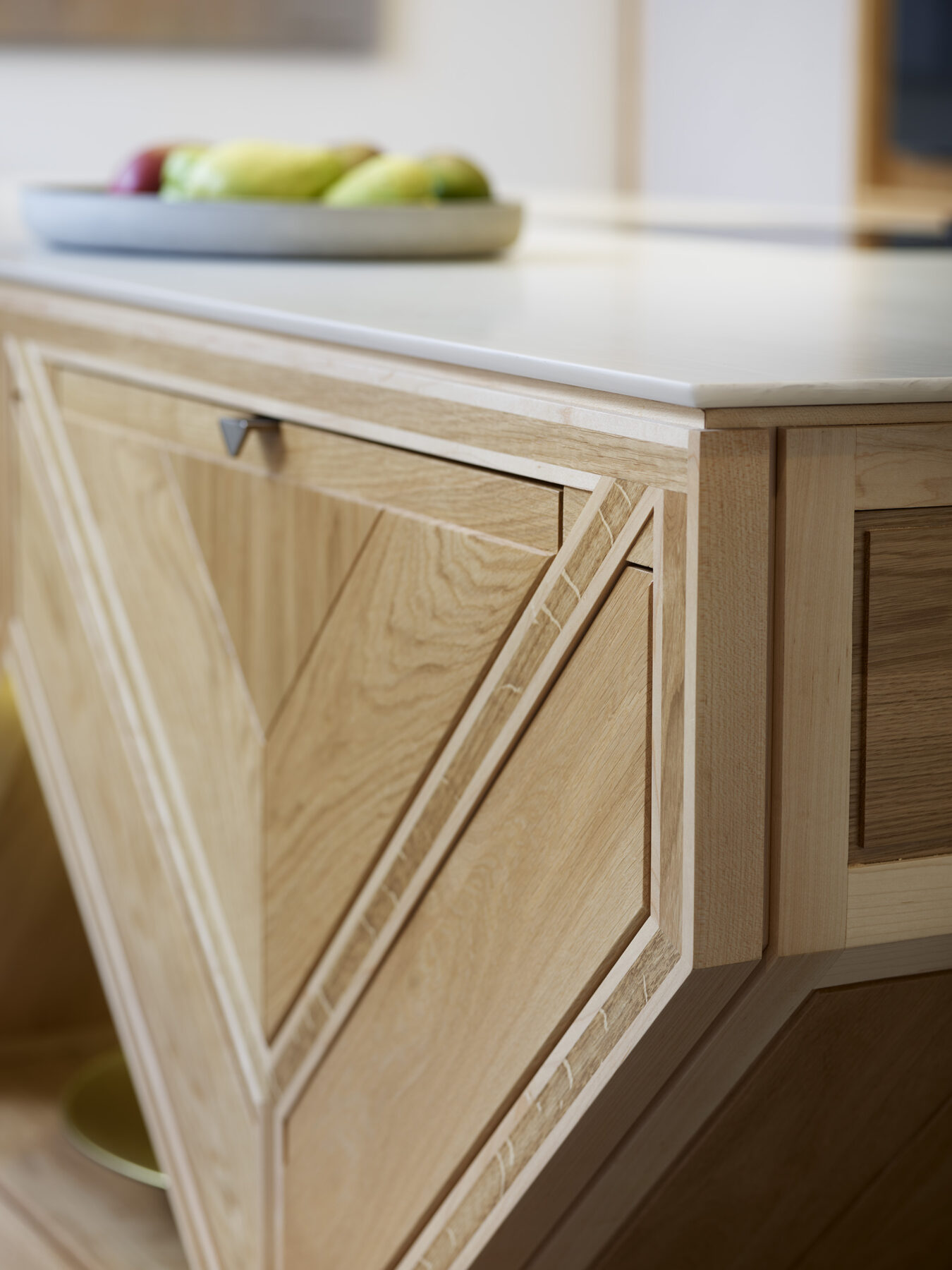
Speak to the Experts
In conclusion, the choice between natural and man-made stone worktops is a personal one, with each option bringing its own set of characteristics and allure to the luxury kitchen space. The diverse options can be overwhelming, and seeking expert advice is advised. With many decades of collective experience in the luxury kitchen industry, the team at Modern Bristis is here to listen to the specific needs of your project, ensuring that the selected surface aligns with both aesthetics and functionality.